Bee Friendly and Support Your Local Mason Bee Population
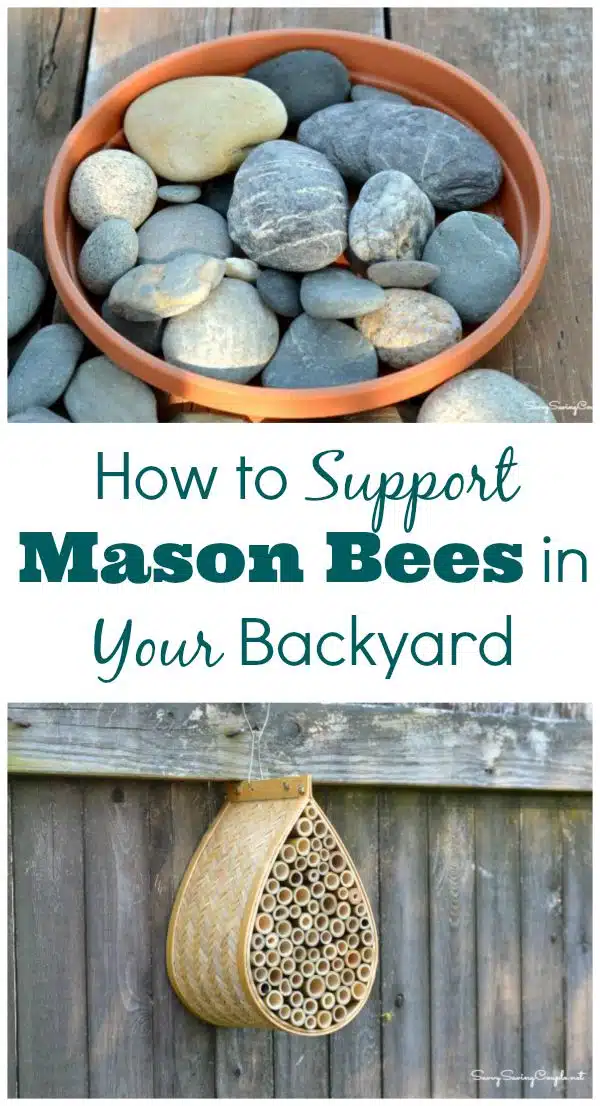
Unlike the European Honey Bee, which most of us are familiar with, Mason Bees are native to the US. They’re found wild mostly throughout the entire US.
Mason Bees are solitary, meaning that they don’t live in colonies like some other types of bees. They seek out holes or tunnels that have been created by wood boring insects. They live and lay their eggs there. The female Mason Bee is already fertile. She collects pollen and nectar from nearby flowers and builds it up in the rear of the nest. She then lays an egg in the nectar and pollen “bed” and covers it with mud. She repeats this until the tunnel is full, and then moves on to another nest or tunnel.
Mason Bees are docile. Male Mason Bees don’t even have a stinger. Females only sting if squeezed or stepped on, so they’re safe to be around children and pets.
One of the biggest benefits of having Mason Bees in your garden is that they’re the ultimate pollinator! Pollination is necessary for plants to survive. Some plants have the ability to self-pollinate, but others rely on bees for pollination. In fact, two thirds of food crops need bees for pollination – some examples are almonds, squash, cucumbers, apples, oranges, blueberries, and peaches. Can you imagine a world without peaches!?

This is obviously very concerning, not only due to environmental impacts, but the economical impacts would also be detrimental. Bees contribute over $20 billion to the U.S. economy and $217 billion to the global economy.
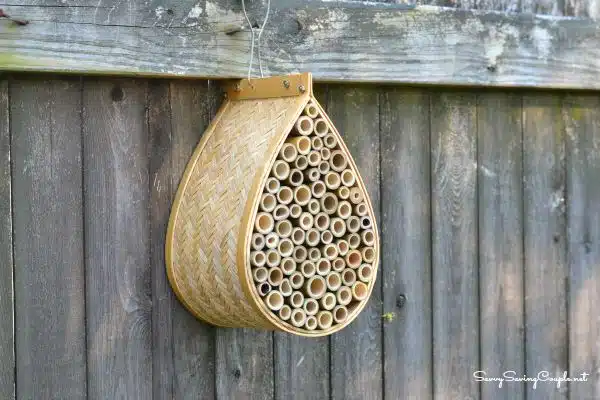
What can you do to help?
- Consider housing bees. The Mason Bee box is a great way to start. Just hang your box outside in an area shielded from wind. We hung ours onto our wooden fence.
Consider making a bee drinking station. We used smooth beach rocks and the bottom of a planter. This provides much needed water for tired bees. Just wash the stones, and fill with water..use less than pictured here so the bees do not drown!
- Buy organic produce as much as possible. The more we do to increase the demand for organic produce, the less demand there will be for toxic chemical pesticides and fertilizers.
- Help spread the word about harmful neonicotinoids. Our food supply depends on it!
Support the BeeAction Campaign from Friends of the Earth and call on the Obama Administration to immediately ban pesticides linked to global bee declines to protect the nation’s food supply, environment and economy. Learn more about how to helps our bees by visiting their official site (above).

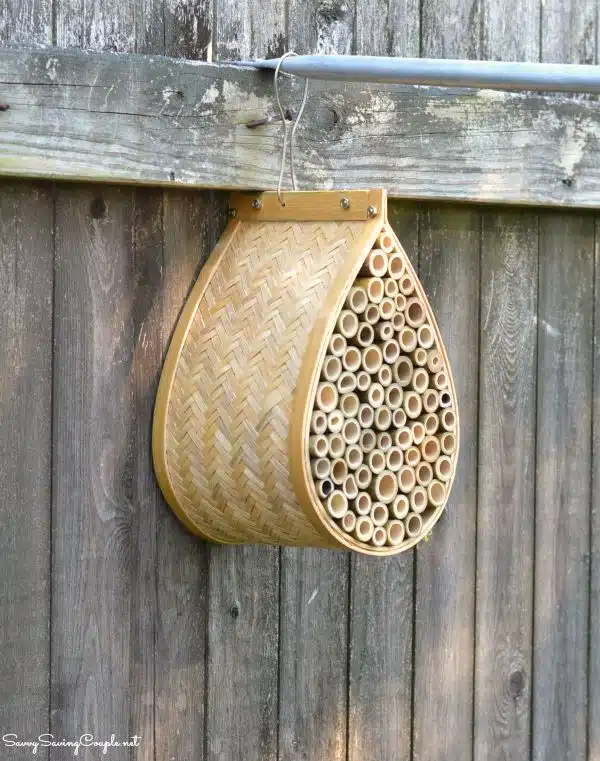
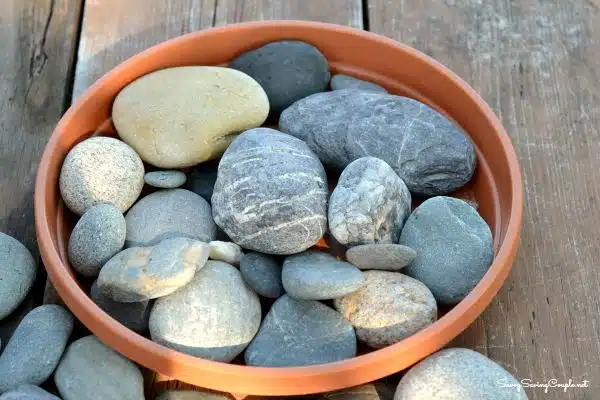
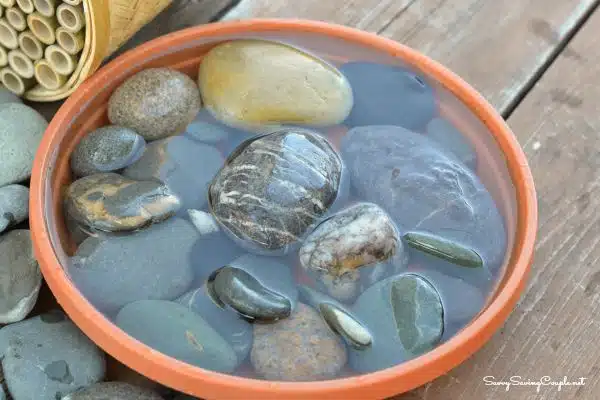
I am scared of bees, but I know without them we would not live. This looks like a great way to keeps bees around. :)
We need to do everything we can to support bees. They’ve been dying off dramatically. That’s kind of scary!
That mason bee house is amazing! I love the design and how it looks. Very beautiful. I really don’t like bees, but this would be neat to have around. I’d keep it further away from the house for the bees though.
The bee population is in severe danger. I think these are all great ideas to help support their dwindling numbers.
The bee decline is such a scary thing. Just one more reason to buy organics- which I love anyway. I have never seen the Mason bee box before but it sure is a pretty addition to a yard.
I need to keep this in mind for when we start a garden next year. This looks so easy and interesting!
I know bees are important, but I would rather someone else keep them in their yard :)
These don’t sting. I’ve had houses for them and they just fly around and never bother me. It’s fun to watch them filling the tubes and knowing they’re doing to pollinate my flowers when they hatch. Also fun for kids to see and learn from. Give it a try!
It’s nice that Mason Bees aren’t very harmful. We’ve been teaching my son to leave bees alone. To him they’re friends anyways, thanks to Mickey Mouse Clubhouse haha.
I recently saw a documentary about bees and it was fascinating. This is such a cool way to support the Mason bee population.
I just listened to a podcast about bees and about some of the issues they are having. It is crazy to realize how much we depend on those little things and how much we should help them
Oh I love this bee house! So cool looking. My brother raises bees!
I am terrified of bees! On the other hand, this is pretty cool! Need to share this with my friend who loves bees and all insects.
This is so awesome! Not enough people realize how important bees are to our planet! I wanna make some of these for my backyard!
The bee house is amazingly beautiful. I love how it looks and would happily help the bee population this way.
I’m not sure if I would want bees in my backyard, but that is a great way to keep them safe! I love the design of it.
I will have to get a hanger like that for my yard. I would love to help the Mason Bees.
Oh this sounds like a great project. I didn’t know about mason bees. I’d love to help them out!
With bees mysteriously dying out, we all have to do our part to help save them! Thanks for showing us another way to support the cause!
I have never heard of these types of bees. They would be cool to have around if I had a big plot of land I could put them out of the way. Also if they made honey.
I recently watched a documentary on the decline in the bee population and just how devastating it would be for us if all the bees disappeared. We need to do what we can to help them to survive. I small homemade hive like this is a good start.
What a great way to help increase the bee population. Thanks for sharing this, we definitely want to house them.
Bee’s are great, I just want them at a distance! I am allergic to them, I have been stung 1 time and it was awful! Without bee’s mankind would not survive!
That bee house is super cute! Your post just reminded me how I haven’t seen any bees or wasps this year. Usually there’s tons but I haven’t even seen one.
I know it’s important to have them but I never thought about having a space for them in the home.. Good tips. I will look into this.